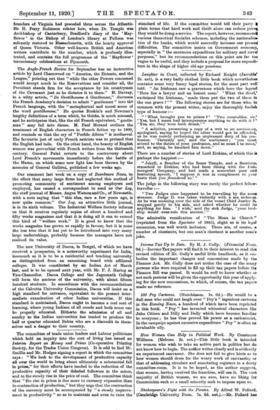The Anglo-French Review for September has an instructive article by
Lord Charnwood on " America, the Entente, and the League," pointing out that " while the other Powers concerned would accept much in the Reservations and consider all, the President stands firm for the acceptance by his countrymen of the Covenant just as he dictates it to them." M. Davray, in a witty article, "De Gentilhowne a Gentleman," discusses the French Academy's decision to admit " gentleman " into the French language, with the " metaphorical and moral sense of the word gentilhomme." He quotes Ruskin's and Newman's lengthy definitions of a term which, he thinks, is much misused, and he anticipates that, like the old French equivalent, " gentle- man " may fall into disuse. M. Paul Morand outlines the treatment of English characters in French fiction up to 1800, and reminds us that the cry of "Perfide Albion" is mediaeval. The favourite jest of early French satirists was to pretend that the English had tails. On the other hand, the beauty of English women was proverbial with French writers from the thirteenth century. General Palat reverts to the controversy about Lord French's movements immediately before the battle of the Marne, on which some new light has been thrown by the memoirs of General Gallieni, published a few weeks ago.


































 Previous page
Previous page